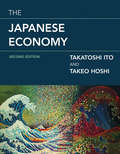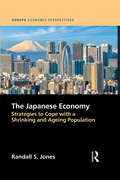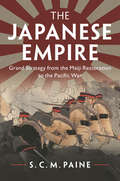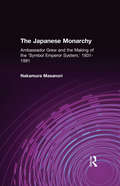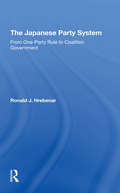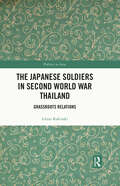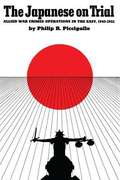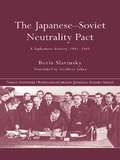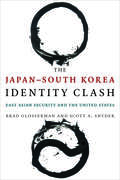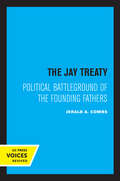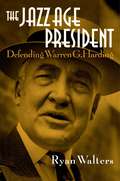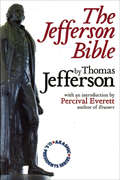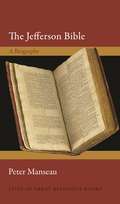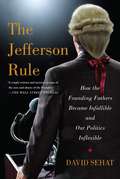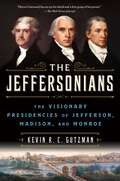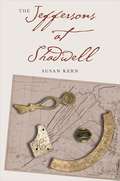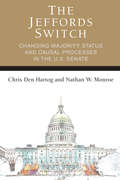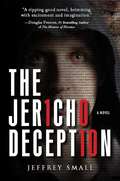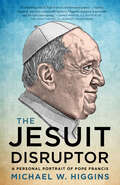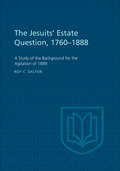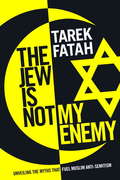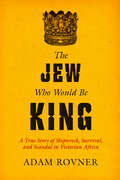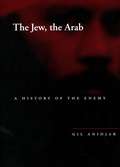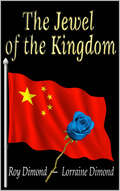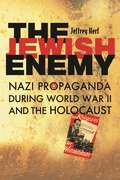- Table View
- List View
The Japanese Economy, second edition
by Takatoshi Ito Takeo HoshiThe second edition of a comprehensive account of all the major aspects of the Japanese economy, substantially updated and expanded.This textbook offers a comprehensive, rigorous but accessible account of all the major aspects of the Japanese economy, grounding its approach in mainstream economics. The second edition has been extensively revised and substantially updated, with new material that covers Japan's period of economic stagnation between 1991 and 2010. The first edition, published in 1992, focused on Japan as a success story of catch-up economic development; this edition reflects the lessons learned from Japan's Lost Two Decades.After presenting the historical background, the book begins with macroeconomics, studying growth and business cycles. It then covers essential policy issues, with new material that takes into account the Japanese banking crisis of 1997–1998 and the global financial crisis of 2008–2009, discussing financial regulation, monetary policy, and fiscal policy. It goes on to examine saving, demography, and social security in light of Japan's ongoing demographic transition; industrial organization; labor markets; international trade and international finance; and the Japan–U.S. relationship. A new chapter offers a detailed analysis of the Lost Two Decades, synthesizing and applying concepts discussed in previous chapters and offering insights into such issues as successful catch-up growth, demographic shifts, and credit booms and busts.
The Japanese Economy: Strategies to Cope with a Shrinking and Ageing Population (Europa Economic Perspectives)
by Randall JonesJapan has many unique strengths, but it also faces numerous challenges, many of which are related to population ageing. Rapid demographic change is projected to reduce Japan’s population by one-quarter by 2060 while increasing the share of elderly people from 29% of the total population to 38%, which would be the highest share among advanced countries. This book analyses the Japanese economy and the challenges it faces, and suggests policies to promote wellbeing, high living standards, fiscal sustainability, social inclusion and environmental sustainability. The book’s 24 chapters focus on key aspects of Japan’s economy, including the labour market, innovation, education, women in the workforce, corporate governance, small and medium-sized enterprises, the service sector, agriculture, fiscal and monetary policy, income distribution and policies to address climate change. The volume aims to increase understanding of Japan, the world’s third-largest economy and a key player in the global economy. It will assist policymakers and serve as a resource for academics and students of economics and public policy. As Japan is a front-runner in population ageing, the book’s analysis and policy recommendations are highly relevant to other countries that are, or soon will be, facing similar challenges.
The Japanese Empire
by Paine S. C. M.The Japanese experience of war from the late-nineteenth to the mid-twentieth century presents a stunning example of the meteoric rise and shattering fall of a great power. As Japan modernized and became the one non-European great power, its leaders concluded that an empire on the Asian mainland required the containment of Russia. Japan won the First Sino-Japanese War (1894-5) and the Russo-Japanese War (1904-5) but became overextended in the Second Sino-Japanese War (1931-45), which escalated, with profound consequences, into World War II. A combination of incomplete institution building, an increasingly lethal international environment, a skewed balance between civil and military authority, and a misunderstanding of geopolitics explains these divergent outcomes. This analytical survey examines themes including the development of Japanese institutions, diversity of opinion within the government, domestic politics, Japanese foreign policy and China's anti-Japanese responses. It is an essential guide for those interested in history, politics and international relations.
The Japanese Monarchy, 1931-91: Ambassador Grew and the Making of the "Symbol Emperor System" (Japan In The Modern World Ser.)
by Masanori Nakamura"The Japanese Monarchy, 1931-1991", which created a sensation when first published in Japanese, clarifies US policies toward Japan's symbol emperor system before, during and after World War II. As American ambassador to Japan from 1932 to 1945, Joseph Clark Grew had contacts with groups close to the emperor as well as leading "moderates". Returning to the US after the outbreak of the war, he made many speeches, first condemning Japanese aggression, but later changing his theme from war to peace, even to suggesting that the emperor would be a key asset in stabilising Japanese society after the war, a view which was widely criticised at the time. Later, as under secretary of state, Grew came to play an important role in the formation of postwar US policy on Japan and the emperor. His view that the emperor was a pacifist who opposed and sought to end the war with the US and that thus postwar Japan should be reconstructed with the emperor and the moderates at the centre, was later adopted in the decision of Douglas MacArthur's occupation to preserve the emperor system. That the evolution of an ambassador's convictions could have such a significant impact, even to this day, on postwar US-Japan relations vividly illustrates the importance of truly understanding the history and culture of another country, whether friend or foe.
The Japanese Party System: From One-party Rule To Coalition Government
by Ronald J Hrebenar“This is a nuts and bolts textbook in the best sense of the term. … It is bound to be a great boon both to teachers and students of contemporary Japanese politics.” —from the Foreword by Haruhiro Fukui This timely volume is the first book in nearly twenty-five years to focus on the party system of Japan. In the past two decades, the Japanese political scene has undergone a dramatic transformation. What had been a two-party system proliferated during the 1960s and 1970s into a seven-party system. This book provides a comprehensive look at all of Japan’s current major and minor national-level parties. For the first time in English, detailed analyses are presented on the Democratic Socialists, the Clean Government party (KÅmeitÅ), and the New Liberal Club. Thorough coverage is provided for parties in the “1955 System”—the ruling Liberal Democratic party and the two long-term opposition parties, the Socialists and the Communists. Many of the new miniparties that have appeared in recent elections are also discussed. Japanese Political Parties gives readers a solid understanding of party histories, leadership, and internal organization, as well as a look at prospects for the future. The party discussions are preceded by three chapters on the laws and political forces affecting Japanese politics. Chapter 1 describes the basic characteristics of the Japanese party system since 1945 and provides an overview of Japanese voting behavior and political values. Chapter 2 describes the “rules of the game”—the electoral laws—and discusses the ongoing political problem of malapportionment. Chapter 3 interprets data on political finance in contemporary Japan. Along with a wealth of information and interpretation, the authors offer insight into the common patterns Japan shares with democracies around the world, placing the Japanese system within the larger context of world party systems. Designed for courses on Japanese politics, this text should also prove useful to students of comparative politics and political parties.
The Japanese Soldiers in Second World War Thailand: Grassroots Relations (Politics in Asia)
by Ichiro KakizakiKakizaki re-examines the real image of the Thai-Japanese alliance during the Second World War by focusing on the incidents and accidents that occurred during the passage through, or the stationing, of the Japanese army in Thailand.The book reveals the grassroots relations between Thais and Japanese by utilizing the records of incidents/accidents between Thais and Japanese during the war. The results show that although the number of incidents/accidents was large at the initial and the last stages of war, those caused by Thais were skyrocketing at the last stage of war while those caused by Japanese reached their peak at the initial stage of war before decreasing. Therefore, the real image of the Thai-Japanese alliance was the alliance of endurance that both Thais and Japanese had to be forced to endure the frequently-occurred incidents/accidents.A book for students and academics interested in the Thai/Southeast Asian war history during the Second World War.
The Japanese on Trial: Allied War Crimes Operations in the East, 1945-1951
by Philip R. PiccigalloThis comprehensive treatment of post-World War II Allied war crimes trials in the Far East is a significant contribution to a neglected subject. While the Nuremberg and, to a lesser degree, Tokyo tribunals have received considerable attention, this is the first full-length assessment of the entire Far East operation, which involved some 5,700 accused and 2,200 trials. After discussing the Tokyo trial, Piccigallo systematically examines the operations of each Allied nation, documenting procedure and machinery as well as the details of actual trials (including hitherto unpublished photographs) and ending with a statistical summary of cases. This study allows a completely new assessment of the Far East proceedings: with a few exceptions, the trials were carefully and fairly conducted, the efforts of defense counsel and the elaborate review procedures being especially noteworthy. Piccigallo's approach to this emotion-filled subject is straightforward and evenhanded throughout. He concludes with a discussion of the broader implications of such war crimes trials, a matter of interest to the general reader as well as to specialists in history, law, and international affairs.
The Japanese-Soviet Neutrality Pact: A Diplomatic History 1941-1945 (Nissan Institute/Routledge Japanese Studies)
by Boris SlavinskyThe neutrality pact between Japan and the Soviet Union, signed in April 1941, lapsed only nine months before its expiry date of April 1946 when the Soviet Union attacked Japan. Japan's neutrality had enabled Stalin to move Far Eastern forces to the German front where they contributed significantly to Soviet victories from Moscow to Berlin. Slavinsky suggests that Stalin's agreement with Churchill and Roosevelt to attack Japan after Germany's surrender allowed him to keep Japan in the war until he was ready to attack and thus avenge Russia's defeat in the war of 1904-1905. The Soviet Union's violation of the pact and the detention of Japanese prisoners for up to ten years after the end of the war created a sense of victimization in Japan to the extent that there is still no formal Peace Treaty between the two countries to this day.Slavinsky draws on recently opened Russian archival material to demonstrate that the Soviet Union was passing information about the Allies to Japan during the Second World War. He also persuasively argues that vengeance and the (re)acquistion of land were the primary motives for the attack on Japan. The book contains empirical data previously unavailable in English and will fascinate anyone with an interest in the history of Japan, the Soviet Union and the events of the Second World War.
The Japan–South Korea Identity Clash: East Asian Security and the United States (Contemporary Asia in the World)
by Brad Glosserman Scott A. SnyderJapan and South Korea are Western-style democracies with open-market economies committed to the rule of law. They are also U.S. allies. Yet despite their shared interests, shared values, and geographic proximity, divergent national identities have driven a wedge between them. Drawing on decades of expertise, Brad Glosserman and Scott A. Snyder investigate the roots of this split and its ongoing threat to the region and the world.Glosserman and Snyder isolate competing notions of national identity as the main obstacle to a productive partnership between Japan and South Korea. Through public opinion data, interviews, and years of observation, they show how fundamentally incompatible, rapidly changing conceptions of national identity in Japan and South Korea—and not struggles over power or structural issues—have complicated territorial claims and international policy. Despite changes in the governments of both countries and concerted efforts by leading political figures to encourage U.S.–ROK–Japan security cooperation, the Japan–South Korea relationship continues to be hobbled by history and its deep imprint on ideas of national identity. This book recommends bold, policy-oriented prescriptions for overcoming problems in Japan–South Korea relations and facilitating trilateral cooperation among these three Northeast Asian allies, recognizing the power of the public on issues of foreign policy, international relations, and the prospects for peace in Asia.
The Jay Treaty: Political Battleground of the Founding Fathers
by Jerald A. CombsThis title is part of UC Press's Voices Revived program, which commemorates University of California Press’s mission to seek out and cultivate the brightest minds and give them voice, reach, and impact. Drawing on a backlist dating to 1893, Voices Revived makes high-quality, peer-reviewed scholarship accessible once again using print-on-demand technology. This title was originally published in 1970.
The Jazz Age President: Defending Warren G. Harding
by Ryan S. Walters"Presidents are ranked wrong. In The Jazz Age President: Defending Warren G. Harding, Ryan Walters mounts a case that Harding deserves to move up—and supplies the evidence to make that case strong. -Amity Shlaes, bestselling author of CoolidgeHe's the butt of political jokes, frequently subjected to ridicule, and almost never absent a "Worst Presidents" list where he most often ends up at the bottom. Historians have labeled him the "Worst President Ever," "Dead Last," "Unfit," and "Incompetent," to name but a few. Many contemporaries were equally cruel. H. L. Mencken called him a "nitwit." To Alice Roosevelt Longworth, he was a "slob." Such is the current reputation of our 29th President, Warren Gamaliel Harding. In an interesting survey in 1982, which divided the scholarly respondents into "conservative" and "liberal" categories, both groups picked Harding as the worst President. But historian Ryan Walters shows that Harding, a humble man from Marion, Ohio, has been unfairly remembered. He quickly fixed an economy in depression and started the boom of the Roaring Twenties, healed a nation in the throes of social disruption, and reversed America&’s interventionist foreign policy.
The Jefferson Bible (Akashic U.S. Presidents Series)
by Thomas JeffersonAn atheist’s analysis of the Founding Father’s document on deism and the philosophy of Jesus.Unlike any other presidential commentaries in print, Akashic’s US Presidents series pairs the writings of these American historical figures with contemporary commentators whose critical viewpoints provide a counterbalance to the overly reverent and conservative analyses that invariably accompany presidential writings.In this volume, Percival Everett, acclaimed author of such novels as Telephone and Erasure and PEN/Faulkner Award finalist, takes an atheist’s-eye-view of the little-known “Jefferson Bible,” the third president’s response to the King James Bible.
The Jefferson Bible: A Biography (Lives of Great Religious Books #58)
by Peter ManseauThe life and times of a uniquely American testamentIn his retirement, Thomas Jefferson edited the New Testament with a penknife and glue, removing all mention of miracles and other supernatural events. Inspired by the ideals of the Enlightenment, Jefferson hoped to reconcile Christian tradition with reason by presenting Jesus of Nazareth as a great moral teacher—not a divine one. Peter Manseau tells the story of the Jefferson Bible, exploring how each new generation has reimagined the book in its own image as readers grapple with both the legacy of the man who made it and the place of religion in American life.Completed in 1820 and rediscovered by chance in the late nineteenth century after being lost for decades, Jefferson's cut-and-paste scripture has meant different things to different people. Some have held it up as evidence that America is a Christian nation founded on the lessons of the Gospels. Others see it as proof of the Founders' intent to root out the stubborn influence of faith. Manseau explains Jefferson's personal religion and philosophy, shedding light on the influences and ideas that inspired him to radically revise the Gospels. He situates the creation of the Jefferson Bible within the broader search for the historical Jesus, and examines the book's role in American religious disputes over the interpretation of scripture. Manseau describes the intrigue surrounding the loss and rediscovery of the Jefferson Bible, and traces its remarkable reception history from its first planned printing in 1904 for members of Congress to its persistent power to provoke and enlighten us today.
The Jefferson Rule: How the Founding Fathers Became Infallible and Our Politics Inflexible
by David SehatIn The Jefferson Rule, historian David Sehat describes how everyone from liberals to conservatives, secessionists to unionists have sought out the Founding Fathers to defend their policies.Beginning with the debate between Thomas Jefferson and Alexander Hamilton over the future of the nation, and continuing throughout our history—the Civil War, the World Wars, the New Deal, the Reagan Revolution, and Obama and the Tea Party—many politicos have asked, “What would the Founders do?” instead of “What is the common good today?” Both the Right and the Left have used the Founders to sort through such issues as voting rights, campaign finance, free speech, war and peace, gun control, and taxes, though those Fathers were a querulous and divided group who rarely agreed. In this “sobering, informative study” (Publisher’s Weekly), Sehat shows why coming to terms with the past would be the start of a productive debate. The result is, simply put, “required reading for those desperate for sane, intelligent political arguments” (Kirkus Reviews, starred review). The Jefferson Rule “takes the reader through an engaging and insightful survey course in American history” (The Christian Science Monitor).
The Jeffersonians: The Visionary Presidencies of Jefferson, Madison, and Monroe
by Kevin R. Gutzman“A long, insightful look at three Founder presidents. … Political histories are rarely page-turners, but Gutzman, clearly a scholar who has read everything on his subjects, writes lively prose and displays a refreshingly opinionated eye for a huge cast of characters and their often unfortunate actions. Outstanding historical writing.” — Kirkus (starred review) A lively and essential chronicle of the only consecutive trio of two-term presidencies of the same political party in American history, from the bestselling author of Thomas Jefferson - Revolutionary and James Madison.Before the consecutive two-term administrations of Presidents Bill Clinton, George W. Bush, and Barack Obama, there had only been one other trio of its type: Thomas Jefferson, James Madison, and James Monroe.Kevin R. C. Gutzman’s The Jeffersonians is a complete chronicle of the men, known as The Virginia Dynasty, who served as president from 1801 to 1825 and implemented the foreign policy, domestic, and constitutional agenda of the radical wing of the American Revolution, setting guideposts for later American liberals to follow.The three close political allies were tightly related: Jefferson and Madison were the closest of friends, and Monroe was Jefferson’s former law student. Their achievements were many, including the founding of the opposition Republican Party in the 1790s; the Louisiana Purchase; and the call upon Congress in 1806 to use its constitutional power to ban slave imports beginning on January 1, 1808. Of course, not everything the Virginia Dynasty undertook was a success: Its chief failure might have been the ineptly planned and led War of 1812. In general, however, when Monroe rode off into the sunset in 1825, his passing and the end of The Virginia Dynasty were much lamented. Kevin R. C. Gutzman’s new book details a time in America when three Presidents worked toward common goals to strengthen our Republic in a way we rarely see in American politics today.
The Jeffersons at Shadwell
by Susan KernMerging archaeology, material culture, and social history, historian Susan Kern reveals the fascinating story of Shadwell, the birthplace of Thomas Jefferson and home to his parents, Jane and Peter Jefferson, their eight children, and over sixty slaves. Located in present-day Albemarle County, Virginia, Shadwell was at the time considered "the frontier. " However, Kern demonstrates that Shadwell was no crude log cabin; it was, in fact, a well-appointed gentry house full of fashionable goods, located at the center of a substantial plantation. Kern's scholarship offers new views of the family's role in settling Virginia as well as new perspectives on Thomas Jefferson himself. By examining a variety of sources, including account books, diaries, and letters, Kern re-creates in rich detail the daily lives of the Jeffersons at Shadwell--from Jane Jefferson's cultivation of a learned and cultured household to Peter Jefferson's extensive business network and oversight of a thriving plantation. Shadwell was Thomas Jefferson's patrimony, but Kern asserts that his real legacy there came from his parents, who cultivated the strong social connections that would later open doors for their children. At Shadwell, Jefferson learned the importance of fostering relationships with slaves, laborers, and powerful office holders, as well as the hierarchical structure of large plantations, which he later applied at Monticello. The story of Shadwell affects how we interpret much of what we know about Thomas Jefferson today, and Kern's fascinating book is sure to become the standard work on Jefferson's early years.
The Jeffords Switch: Changing Majority Status and Causal Processes in the U.S. Senate (Legislative Politics And Policy Making)
by Nathan Monroe Chris Den HartogSenator Jim Jeffords left the Republican Party in May 2001 and became an independent. Because he agreed to vote with the Democrats on organizational votes, this gave that party a 51–49 majority in the Senate. Using the “Jeffords switch,” Chris Den Hartog and Nathan W. Monroe examine how power is shared and transferred in the Senate, as well as whether Democratic bills became more successful after the switch. They also use the data after the switch, when the Republican Party still held a majority on many Democratic Party-led committees, to examine the power of the committee chairs to influence decisions. While the authors find that the majority party does influence Senate decisions, Den Hartog and Monroe are more interested in exploring the method and limits of the majority party to achieve its goals.
The Jericho Deception
by Jeffrey SmallAt the intersection of science and spirituality lies the human mind.The Jericho Deception is a psychological adventure into the interplay of mind and spirit, science and religion, mystery and mysticism. A mysterious death in a Yale lab, a secret facility hidden in the Egyptian desert, a desperate chase through the ruins of pharaohs: all linked together by a psychological experiment that promises to expose the innermost workings of the human mind and soul. Ignoring the skepticism of his Yale colleagues, neuro-psychologist Dr. Ethan Lightman has dedicated his professional career to developing the Logos, a device that induces mystical experiences of the divine in his subjects through the use of electro-magnetic brain stimulation. After the mysterious death of his mentor in their Yale lab, Ethan is suspended from his research and teaching duties. Distraught, he uncovers a coded message written by his mentor on the night of his death that leads him to discover that the foundation funding their Logos project is a covert front for the CIA. Questioning his future, Ethan jumps at a cryptic invitation from the foundation's head to meet in person. He boards a private plane that whisks him to a remote desert in Egypt where he is brought to The Monastery, a secret religious training camp run by the CIA. Ethan is shocked to learn that the CIA is using his device, the Logos, to reprogram Islamic fundamentalists into Christians in a covert operation they refer to as Project Jericho. Asked to fix a flaw in the Logos that turns certain subjects psychotic, Ethan must decide whether to continue research that could plunge the Middle East into a religious war if it is discovered or to give up on his life's work and possibly his own life.Ethan makes his fateful decision after he befriends a Muslim doctor, falsely imprisoned as a suspected terrorist. Their escape leads to a harrowing chase through a Bedouin desert camp in the dead of night, a violent confrontation with his mentor's murderer in the majestic ruins of an ancient temple in Luxor, and a final resolution with the deputy director of the CIA's covert operations in bustling market in Cairo. Along the way, Ethan discovers that the Logos also holds the key to understanding a mysterious mystical experience he has suppressed from his past.
The Jesuit Disruptor: A Personal Portrait of Pope Francis
by Michael W. HigginsA fresh look at a complex pope with a simple agenda: radically reforming the Catholic Church. Jorge Mario Bergoglio is the consummate disruptor, disrupting archaic modes of church governance, disrupting our collective spiritual complacency in the face of new challenges to our human flourishing while at the same time remaining deeply faithful to the organic traditions of the church. He is the leader of the Roman Catholic Church, but beyond that he is a universal leader with commanding moral presence, able to connect with laypeople and with non-Christian faiths. Pope Francis is also a credible moral voice on issues of immigration, economic inequity, the devastating consequences of political populism, and the accelerating threats to the environment, in spite of the fact that he faces deep infrastructure and governance scandals in his organization. In his determination to reform the Vatican and ensure the Catholic faith evolves in a way that is relevant to the 21st century, Francis is very much carrying on the tradition of the Jesuits, an order known for their work in education, humanitarian missions, and social justice. A deep understanding of the Jesuit order informs Michael W. Higgins’s approach in this novel reading of a papacy unlike any other.
The Jesuits' Estate Question, 1760-1888: A Study of the Background for the Agitation of 1889 (Canadian Studies in History and Government #11)
by Roy DaltonMore than a hundred years of trouble followed the land grant of half a million acres along the St. Lawrence River to the Jesuits. The history of this land is a turbulent one that involved every area of colonial settlement and finally threatened Confederation. In 1888 the Quebec legislature passed an "Act Respecting the Settlement of the Jesuits' Estates": the result was a storm of protest that came close to shattering the union of the provinces. At the time of this Act there was no balanced historical account of the Jesuits' estates. nor until this one has there been any subsequent study that has ever begun to explore their tangled history. Professor Dalton provides a badly needed investigation into this area of Canadian history: his work is unbiased and thorough and offers new material for a reappraisal of this century of our past. (Canadian Studies in History and Government, No. 11.)
The Jew Is Not My Enemy: Unveiling the Myths That Fuel Muslim Anti-Semitism
by Tarek FatahA liberal Muslim and critically acclaimed author explores the historical, political, and theological basis for centuries of Muslim animosity towards Jews, debunking long-held myths and tracing a history of hate and its impact today. More than nine years after 9/11 and 60 years after the creation of the state of Israel, the world is no closer to solving, let alone understanding, the psychological and political divide between Jews and Muslims. While countless books have been written on the subject of terrorism, political Islam, and jihad, barely a handful address the theological and historical basis of the Jew--Muslim divide. Following the terrorist attacks on Mumbai in November 2008, in which Pakistani jihadis sought out and murdered the members of a local Jewish centre, Tarek Fatah began an in-depth investigation of the historical basis for the crime.In this provocative new book, Fatah uses extensive research to trace how literature from as early as the seventh century has fueled the hatred of Jews by Muslims. Fatah debunks the anti-Jewish writings of the Hadith literature, takes apart the Arab supremacist doctrines that lend fuel to the fire, and reinterprets supposed anti-Jewish passages in the Quran. In doing so he argues that hating Jews is against the essence of the Islamic spirit and suggests what needs to be done to eliminate the agonizing friction between the two communities.
The Jew Who Would Be King: A True Story of Shipwreck, Survival, and Scandal in Victorian Africa
by Adam Laurence Rovner"Brings the nineteenth century to life, with its attendant disease, violence, and colonial machinations."—Jewish Book Council "In Rovner's deeply researched biography, the adventurer's swashbuckling memoirs are. . . . a crowbar of sorts, used to pry open a window onto an era of possibility, prejudice and burgeoning colonial avarice."—NPRThis vivid reconstruction of one man’s life reveals the harsh realities and moral ambiguities of colonial power. The Jew Who Would Be King tells the story of Nathaniel Isaacs—a nineteenth-century British Jew who helped establish the Zulu kingdom only to become a ruthless warlord and slaveholder. Isaacs’ thrilling journey begins with his shipwreck on the shores of Zululand and proceeds to ports across West Africa, including Freetown, Sierra Leone. There, tasked by the colonial governor to end the local slave trade, Isaacs brokered deals that reinforced his own power. Adam Rovner's meticulous archival research in England, Sierra Leone, South Africa, and St. Helena, coupled with his own travels to the remnants of Isaacs’ island stronghold in Guinea, brings this complex figure to life. Through Isaacs’ story, Rovner exposes the entangled forces of Jewish emancipation and antisemitism, slavery and abolition, the stark dichotomies of civilization and "savagery," and the creation of whiteness versus Blackness.
The Jew, The Arab: A History of the Enemy (Cultural Memory in the Present #440)
by Gil AnidjarIs there a concept of the enemy? To what discursive sphere would it belong? Or, if there is no concept of the enemy, what are the factors that could have prevented its articulation? Following the reflections of Carl Schmitt and Jacques Derrida on the theologico-political, and reading canonical texts from the Western philosophical, political, and religious traditions, the author seeks to account for the absence of a history of the enemy. <P><P> The question of the enemy emerges in this book as contingent on the way Europe has related to both Jew and Arab as concrete enemies. Moreover, the author provocatively argues that the Jew and the Arab constitute the condition of religion and politics. Among the many strengths of the book is the timeliness of its profound study of contemporary actuality: the volume provides a basis for a philosophical understanding of the forces at work that produced and kindled current conflicts in Europe, the U.S., and the Middle East.
The Jewel of the Kingdom
by Roy Dimond Lorraine Dimond<p>Amid an attempted assassination, the secrets of an ancient library, and looming climate disaster, China stands at a crossroads in this taut thriller. Decades ago, an old woman in an Egyptian bookstore implemented a plan inspired by manuscripts rescued from the ancient Library of Alexandria. These papers predicted that when global climate change threatened humanity, opportunity would manifest—but to take advantage, China must awaken.<p> <p>However, with the attempted murder of the Dalai Lama, someone is trying to return China to the old ways of Mao. How do the shocking similarities between quantum physics, Buddhism, and the ancient Japanese game of Go provide answers? Only when the paths of a woman code-named The Blue Rose, sequestered in the Tiger Monastery of Bhutan, and the youngest high-ranking Chinese Communist known as The Seeker, converge will solutions become clear. While lovers embrace and assassins stalk their prey, the Middle Kingdom sits on a geopolitical precipice. One path leads to the old ways, the other to a new world . . .<p>
The Jewish Enemy: Nazi Propaganda during World War II and the Holocaust
by Jeffrey Herf<p>The sheer magnitude of the Holocaust has commanded our attention for the past sixty years. The extent of atrocities, however, has overshadowed the calculus Nazis used to justify their deeds. <p>According to German wartime media, it was German citizens who were targeted for extinction by a vast international conspiracy. Leading the assault was an insidious, belligerent Jewish clique, so crafty and powerful that it managed to manipulate the actions of Roosevelt, Churchill, and Stalin. Hitler portrayed the Holocaust as a defensive act, a necessary move to destroy the Jews before they destroyed Germany. <p>Joseph Goebbels, Minister of Propaganda, and Otto Dietrich’s Press Office translated this fanatical vision into a coherent cautionary narrative, which the Nazi propaganda machine disseminated into the recesses of everyday life. Calling on impressive archival research, Jeffrey Herf recreates the wall posters that Germans saw while waiting for the streetcar, the radio speeches they heard at home or on the street, the headlines that blared from newsstands. The Jewish Enemy is the first extensive study of how anti-Semitism pervaded and shaped Nazi propaganda during World War II and the Holocaust, and how it pulled together the diverse elements of a delusionary Nazi worldview. Here we find an original and haunting exposition of the ways in which Hitler legitimized war and genocide to his own people, as necessary to destroy an allegedly omnipotent Jewish foe. In an era when both anti-Semitism and conspiracy theories continue to influence world politics, Herf offers a timely reminder of their dangers along with a fresh interpretation of the paranoia underlying the ideology of the Third Reich.</p>
